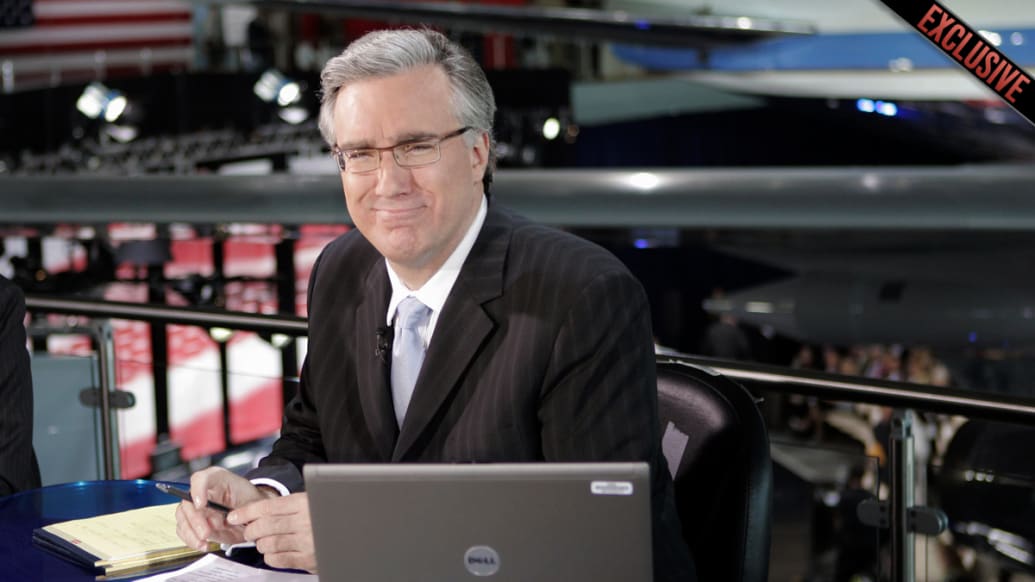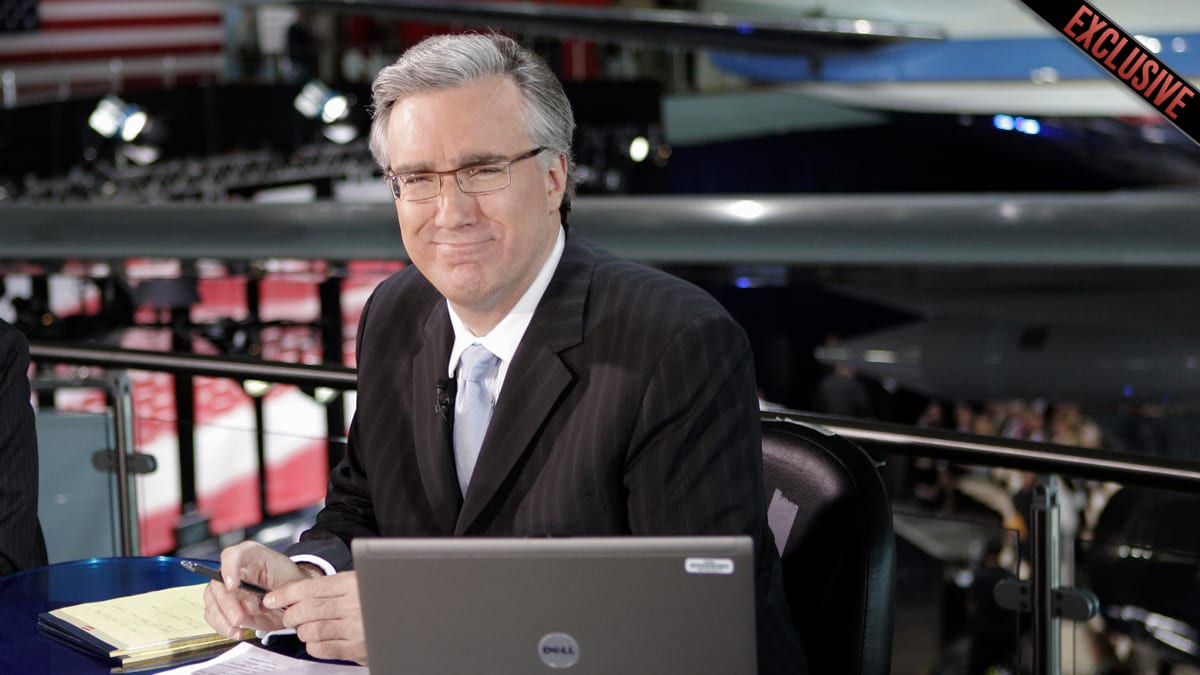It was a terrible marriage from the beginning.

Just weeks after Keith Olbermann launched his nightly program on Current TV last June, his team was complaining that the network founded by Al Gore and attorney Joel Hyatt wasn’t living up to its promises to support a professional cable news show.
The arguments escalated for months, with Olbermann directly appealing to the former vice president on three or four occasions, until relations had become so poisoned that, on Friday, Current fired Olbermann for breach of contract. He has vowed to take the matter to court and questioned the ethics of Gore and Hyatt.
Some of the disputes are fundamental—such as missing days of work—and some sound petty, but they add up to a portrait of a dysfunctional alliance that was doomed from the start. Where Current management viewed Olbermann as a chronic complainer who had clashed with the bosses before leaving his previous jobs at MSNBC and ESPN, the liberal commentator came to believe that he had joined a rinky-dink operation, even if the channel was committed to paying him $50 million over five years.
On Aug. 2, 2011, according to emails reviewed by The Daily Beast, Olbermann’s manager, Michael Price, sent Hyatt a list of about 40 “deficiencies” that needed to be corrected. Six days later, Price told Hyatt that the problems required “immediate attention” and that “we are not aware of any demonstrable effort to address the issues.”
One of management’s complaints was that Olbermann would not participate in some press and marketing events, even though he was contractually obligated to promote the network. Executives grew upset when Olbermann balked at touting the programming that followed his 8 p.m. show, Countdown. In the email, Price explained that reluctance by saying the host was being given wrong information about what was to air. It was “inexcusable,” he wrote, to repeatedly have Olbermann “identify incorrect programming following Countdown. If people cannot trust him to correctly identify the programming, his credibility on larger matters comes into question.”
What’s more, he said, Olbermann was told to identify New York Times columnist Paul Krugman on the air as a Countdown contributor when it turned out he was not. The email asked for “demonstrable efforts” that these problems were being fixed.
Hyatt responded that day, saying that David Bohrman, a CNN executive who had just been hired as Current’s president, would be on the case. “We not only take the issues seriously, but we hired David to assure that any problems with Countdown are dealt with expeditiously and expertly,” Hyatt wrote. Bohrman, he said, has the experience to “assure the quality of Current’s ability to support Countdown.”
On Sept. 21, Bohrman wrote to Olbermann and Price, saying he would move “quickly” to resolve the problems at the Manhattan studio that were making Countdown a “less than high-class production.” He promised to hire a full-time publicist and said “we will get done almost all the things you need and have been asking for.”
Despite the conciliatory tone, Olbermann’s team was not satisfied. Countdown had been “a daily logistical nightmare dating back to the very first rehearsals,” Price wrote back. The response showed “how completely out of touch you and Current management are with the realities of producing a first-rate show.” Viewers were even complaining that they couldn’t record the show because of incorrect settings being provided for DVR machines. The whole atmosphere “more closely resembles cable access than that of a cable news show,” and the problems were “causing low ratings ... The show’s production values have actually gotten worse, not better.”
Olbermann never came close to the more than 1 million viewers he had averaged at MSNBC, but his Current show was drawing more than 100,000 in the prized 25-to-54 age group last summer—and that gradually dwindled to 30,000.
Neither side would comment because of the likely litigation, but sources familiar with the situation provided further details of what amounted to a slow-motion divorce.
What is clear from the correspondence is that the relationship was dissolving amid a flurry of mutual recriminations. Gore had welcomed Olbermann as the new face of a little-watched network, anointing him chief news officer and giving him an equity stake in the operation. Gore had dealt with big egos in politics, but he and Hyatt told colleagues they had never dealt with anyone quite like Olbermann. On the few occasions when Olbermann wrote to Gore, the onetime presidential candidate sent back polite but vague notes that essentially referred the questions to Hyatt.
Current spent $250,000 on the problem-plagued New York studio that Olbermann helped design. But good intentions aside, the production problems were quite real. On Feb. 10, the lighting failed while Olbermann was on the air, and not for the first time, prompting more correspondence. Three weeks ago, Olbermann’s team sounded out of patience. “David, once again Current’s technical breakdowns have had a negative impact on Countdown,” Price wrote Bohrman on March 8. “We have pleaded with you to focus on the studio and the constant technical failures that diminish the program and turn away the viewership.”
The previous night, the email noted, “while Keith was in mid-sentence, the show cut away from him to a promo for the War Room,” the new show hosted by former Michigan governor Jennifer Granholm. The situation was “wholly unacceptable ... This diminishes the ratings of Current’s most successful show and proves to viewers that Current need not be taken seriously.” Bohrman responded within 90 minutes, saying he had been on the phone with the control room as soon as the cameras cut away from Olbermann and that supervisors “insist it will not happen again ... We will stay on them.”
But the clock was running out.
The principal beef of Current executives is that the highly paid Olbermann often didn’t show up for work, missing 19 of 41 days in January and February. But no one has suggested that he wasn’t contractually entitled to that time as vacation and sick days.
The host’s absence was especially noticeable on the nights of the Iowa caucuses and New Hampshire primary, when he was asked to anchor the channel’s coverage. Olbermann felt the technical glitches plaguing his program cast doubt on the feasibility of live election coverage. According to people familiar with the correspondence, Current executives were exasperated when, on Feb. 27, Price wrote that “Keith is planning to take vacation days,” including on March 5—the day before Super Tuesday. This would become a major flash point between the two sides—indeed, it would lead to a legal threat—when Current insisted that he show up.
Bohrman wrote Price the next night that the network needed Olbermann on the air just before the biggest night of the presidential primary season—and if not, Current would probably preempt Countdown. He added that he was disappointed that Countdown was airing a three-hour-old taped show at that very moment, with Mitt Romney winning the Michigan primary—and that this was a “bad choice.”
Things went downhill from there. After Borman insisted that Olbermann work March 5, Price said he was being highly unprofessional. He wrote that Current had failed to provide a list of acceptable guest hosts (except for Eliot Spitzer, who was unavailable). They would not stand for preempting Countdown or allowing an unapproved guest host, Price said, and “ultimately a jury” might have to decide whether replacing Countdown that night was a breach of contract.
From Olbermann’s perspective, this was a period when he was battling a throat infection, and he was concerned that being on the air March 5 might cause him to lose his voice during three hours of live coverage the next evening. In fact, he was so concerned about his voice that he all but stopped speaking when he wasn’t on the air, forcing those around him to communicate with him by email.
After Olbermann both anchored and produced the Super Tuesday coverage, his team took it as a small victory when Bohrman emailed an interim producer: “Looked really good. Thanks.”
But the damage had been done. By month’s end, Olbermann would be replaced by Spitzer, who resigned as New York governor after a prostitution scandal and lost his short-lived CNN show last year.
The impasse went well beyond his attendance record. Current officials were rankled that on the nights that he was off, Olbermann wouldn’t allow his staffers to promote Countdown or its guest hosts, even through Twitter updates. (Olbermann did plenty of promotional tweets when he was anchoring.)
Even the subject of internal communications was contentious. Some at Current were miffed when Olbermann refused to talk to certain executives except through his lawyer or agent; his team believed they were following procedures set down by Hyatt.
No issue was too small to precipitate a fight. A continuous argument over which car service would ferry Olbermann, who doesn’t drive, was emblematic of the deteriorating situation. Olbermann wound up using eight different car services, finding fault with each one, sometimes objecting when drivers talked to him.
His side has depicted this as a budgetary problem. Price warned in a memo last summer that his team was hearing “from vendors that Current has fallen into arrears,” creating problems with delayed or nonexistent payments. The network counters that other employees continued to use the hired cars without incident.
Olbermann, of course, is no stranger to contentious departures, having left MSNBC twice (most recently 14 months ago) as well as ESPN under bitter circumstances. But the Current deal was supposed to be different because it was a self-proclaimed liberal channel and not a major corporation, with Olbermann granted a leading management role.
The lawyers will have to sort out the charges and countercharges, but it is hard to argue, given Olbermann’s high-profile role at the network, that the breakup is making either side look good.

